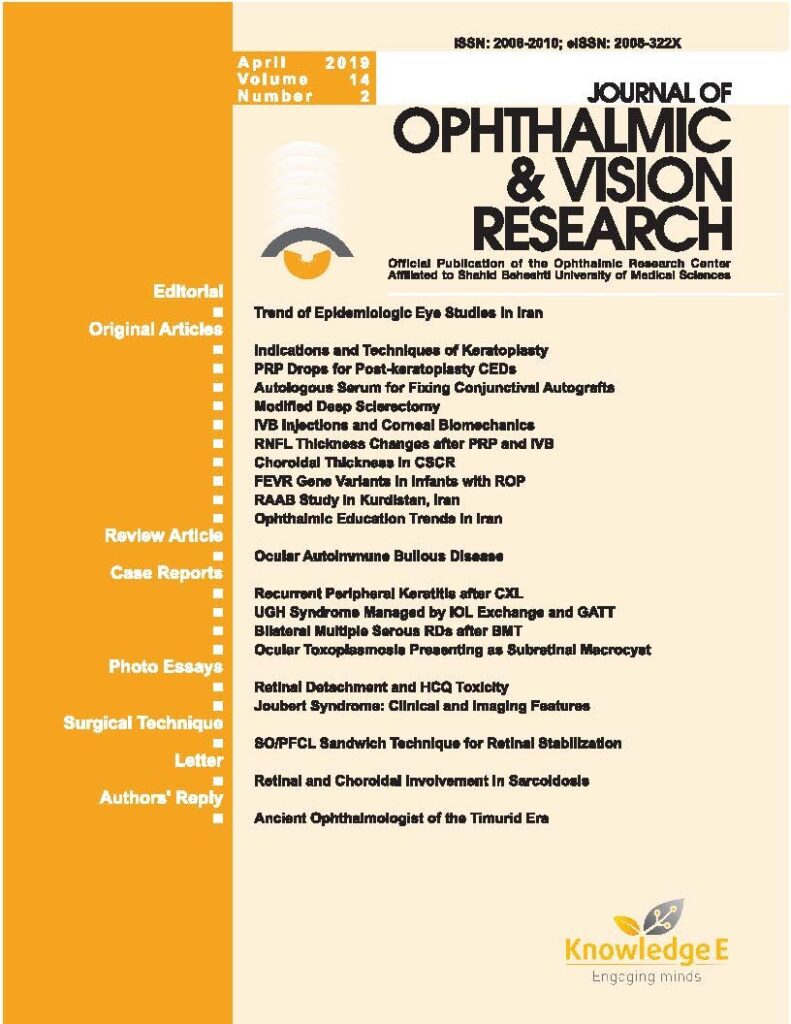
Journal of Ophthalmic and Vision Research
ISSN: 2008-322X
The latest research in clinical ophthalmology and vision science
Effect of Collagen Cross-linking on Rigid Gas Permeable Contact Lens Comfort in Keratoconus
Published date:Dec 31 2024
Journal Title: Journal of Ophthalmic and Vision Research
Issue title: Oct–Dec 2024, Volume 19, Issue 4
Pages:405 - 412
Authors:
Abstract:
Purpose: To compare rigid gas permeable (RGP) contact lens comfort in patients with keratoconus who underwent corneal cross-linking (CXL) versus those without CXL surgery.
Methods: This prospective study was carried out on 41 eyes (25 patients). Specifically, 21 eyes were assigned to the CXL group and 20 eyes to the non-CXL group. All of the patients were fitted with RGP lenses. The patients were also assessed one and three months after the initial RGP fitting. They were asked to grade themselves on a scale from 1 to 4 according to the frequency and intensity of ocular discomfort, vision fluctuation, and overall comfort with RGP lenses.
Results: The mean age of participants was 24.5 ± 3.20 years. There was no significant difference in the intensity of fluctuations in vision (P = 0.30), frequency of discomfort (P = 0.29), and intensity of discomfort (P = 0.31) between the two groups during the one- and three-month follow-up interviews.
Conclusion: Based on the current study, there is no significant disparity in self-reported discomfort with RGP contact lenses between patients with keratoconus who have undergone corneal CXL and those who have not.
Keywords: Contact Lens Discomfort, Corneal Cross Linking, Keratoconus, Rigid Gas Permeable
References:
1. Rabinowitz YS. Keratoconus. Surv Ophthalmol 1998;42:297–319.
2. Espandar L, Meyer J. Keratoconus: Overview and update on treatment. Middle East Afr J Ophthalmol 2010;17:15–20.
3. Downie LE, Lindsay RG. Contact lens management of keratoconus. Clin Exp Optom 2015;98:299–311.
4. Lim L, Lim EW. Current perspectives in the management of keratoconus with contact lenses. Eye (Lond) 2020;34:2175–2196.
5. Wollensak G, Wilsch M, Spoerl E, Seiler T. Collagen fiber diameter in the rabbit cornea after collagen crosslinking by riboflavin/UVA. Cornea 2004;23:503–507.
6. Spoerl E, Wollensak G, Seiler T. Increased resistance of crosslinked cornea against enzymatic digestion. Curr Eye Res 2004;29:35–40.
7. Raiskup-Wolf F, Hoyer A, Spoerl E, Pillunat LE. Collagen crosslinking with riboflavin and ultraviolet-A light in keratoconus: Long-term results. J Cataract Refract Surg 2008;34:796–801.
8. Wollensak G, Spoerl E, Seiler T. Riboflavin/ultravioleta- induced collagen crosslinking for the treatment of keratoconus. Am J Ophthalmol 2003;135:620–627.
9. Terry RL, Schnider CM, Holden BA, Cornish R, Grant T, Sweeney D, et al. CCLRU standards for success of daily and extended wear contact lenses. Optom Vis Sci 1993;70:234–243.
10. Ünlü M, Yüksel E, Bilgihan K. Effect of corneal cross-linking on contact lens tolerance in keratoconus. Clin Exp Optom 2017;100:369–374.
11. Visser ES, Soeters N, Tahzib NG. Scleral lens tolerance after corneal cross-linking for keratoconus. Optom Vis Sci 2015;92:318–323.
12. Mandathara PS, Kalaiselvan P, Rathi VM, Murthy SI, Taneja M, Sangwan VS. Contact lens fitting after corneal collagen cross-linking. Oman J Ophthalmol 2019;12:177–180.
13. Singh K, Bhattacharyya M, Arora R, Dangda S, Mutreja A. Alterations in contact lens fitting parameters following cross-linking in keratoconus patients of Indian ethnicity. Int Ophthalmol 2018;38:1521–1530.14. Koppen C, Gobin L, Mathysen D, Wouters K, Tassignon MJ. Influence of contact lens wear on the results of ultraviolet A/riboflavin cross-linking for progressive keratoconus. Br J Ophthalmol 2011;95:1402–1405.
15. Mazzotta C, Traversi C, Baiocchi S, Caporossi O, Bovone C, Sparano MC, et al. Corneal healing after riboflavin ultraviolet-A collagen cross-linking determined by confocal laser scanning microscopy in vivo: Early and late modifications. Am J Ophthalmol 2008;146:527–533.
16. Kontadakis GA, Kymionis GD, Kankariya VP, Pallikaris AI. Effect of corneal collagen cross-linking on corneal innervation, corneal sensitivity, and tear function of patients with keratoconus. Ophthalmology 2013;120:917–922.
17. Carracedo G, Martin-Gil A, Peixoto-de-Matos SC, Abejón- Gil P, Macedo-de-Araújo R, González-Méijome JM. Symptoms and signs in rigid gas permeable lens wearers during adaptation period. Eye Contact Lens 2016;42:108–114.
18. Edrington TB, Gundel RE, Libassi DP, Wagner H, Pierce GE, Walline JJ, et al.; CLEK STUDY GROUP. Variables affecting rigid contact lens comfort in the collaborative longitudinal evaluation of keratoconus (CLEK) study. Optom Vis Sci 2004;81:182–188.
19. Wu Y, Tan Q, Zhang W, Wang J, Yang B, Ma W, et al. Rigid gas-permeable contact lens related life quality in keratoconic patients with different grades of severity. Clin Exp Optom 2015;98:150–154.